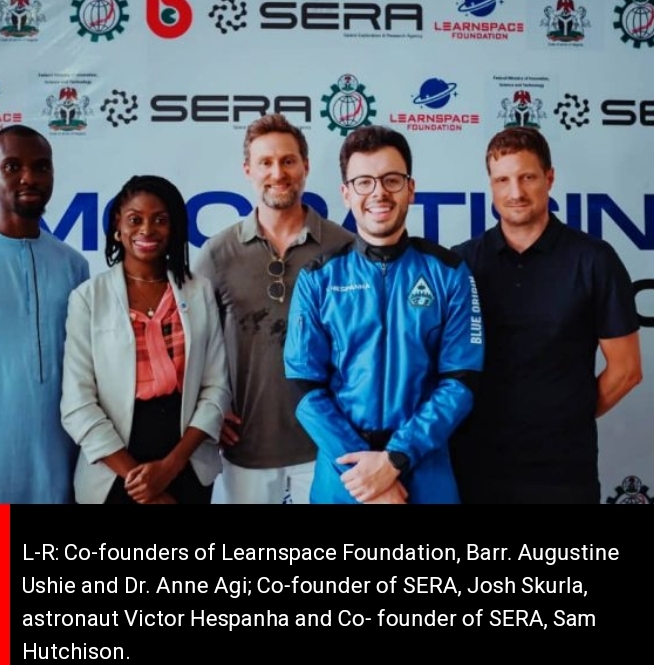The Space Exploration Research Agency, SERA, a United States entity has elaborated on its mission to send the first Nigerian civilian to space.
This marks a milestone in Nigeria’s space exploration journey, positioning the country as the first in Africa to achieve such a feat.
In an exclusive interview, SERA’s co-founders, Joshua Skurla and Mr Sam Hutchison revealed that the project is fully sponsored by SERA with no financial commitment from the Federal Government.
They also noted that the selection process would be democratic. Nigerians will vote to choose their representative for this historic mission.
Skurla emphasised SERA’s goal- raising awareness about the benefits of space exploration and encouraging private sector investment in the industry.
Nigeria boasts a rich history in space exploration, supported by a competent space agency and talented engineers, researchers, and scientists. The country’s entrepreneurial culture and expertise in mining and agriculture make it an attractive partner for SERA.
Hutchison said, “Nigeria has much to gain from space exploration, and we believe the private sector should consider how space can fuel business growth.”
The duo explained, “Resources are limited on our planet, but in space, they’re abundant. Hundreds of thousands of asteroids—composed of materials like platinum, nickel, tungsten, and rare earth elements—float freely, waiting to be tapped. Nigeria cannot afford to look away from these resources in space. The nation must key in.”
The partnership with the Nigerian Space Research and Development Agency ensures the project’s legitimacy. The first Nigerian astronaut will not only make history but also gain worldwide fame and return to contribute his quota to the nation’s economic development.
SERA emphasised the inspirational aspect of space exploration. “Now is the right time to ignite that inspiration by providing ideas like our mission,” they asserted.
“This mission opens a new chapter in Nigeria’s space journey. With a strong Science, Technology, Education and Mathematics culture and entrepreneurial spirit, the possibilities are boundless,” they noted.
In a separate interview the President of Learn Space Foundation, Dr Anne Agi—an NGO advocating for space exploration in Nigeria and also responsible for encouraging SERA to choose Nigeria as one of its beneficiary countries and facilitating the partnership process,—highlighted the country’s potential. She spoke of the various benefits of engaging in space exploration and technology and urged Nigeria to consider investing in and building a launch site for space vehicles, akin to an airport for aeroplanes, attracting investors and generating income through satellite launches and data services.
“Nigeria should consider building a launch site for space vehicles, similar to an airport, to attract investors and generate income from commercial activities in the space economy, such as launching satellites and providing data,” she said.
At the signing of the Memorandum of Understanding between SERA and the Federal Government in Abuja recently, the Minister of Innovation, Science, and Technology Uche Nnaji reaffirmed Nigeria’s commitment to human spaceflight.
“Our aspiration isn’t random; it’s a core objective of the Nigeria Space Policy and Programme,” he stated. “Reviving and implementing abandoned national plans aligns with our Renewed Hope Agenda,” he said.
As Nigeria reaches for the stars, the dream of human spaceflight becomes a reality—one that promises to inspire generations to come.
The Director-General of NASRDA, Dr Matthew Adepoju also emphasised that the cost of sending a Nigerian to space had been fully sponsored by SERA, adding that the event marked the commencement of the agency’s efforts to implement part of its roadmap of having a human spaceflight.
He also said the event was worth celebrating at a time when Nigeria was marking the 25 years of its space programme.
“The Human Spaceflight Programme is one of the cardinal objectives of National Space Policy and Programme.
“It was with this in mind that we established the Department of Physical and Life Sciences about three years ago to forge this mandate.
“This is also coming as one of our deep space explorations because there are many spinoffs that will come from the collaboration and opportunities opened for Nigerians,” he said.
In 2016, Nigeria announced plans to send an astronaut into space by 2030, as part of its drive to develop a world-class space industry. The launch will mark the first-ever manned excursion into outer space by an African nation in the history of space exploration.
The National Space Research and Development Agency had previously assured Nigerians of its determination to collaborate with its Chinese affiliates in spearheading the groundbreaking initiative until the recent collaboration with SERA.
Related posts
Categories
- Advertisements (1)
- Agriculture (45)
- Breaking News (26)
- Business (598)
- Crime (991)
- Education (320)
- Entertainment (128)
- Features (13)
- For The Records (43)
- Foreign News (1,190)
- Health (219)
- Home News (332)
- Interview (9)
- Judiciary (352)
- Lifestyle (140)
- Local News (111)
- National News (1,448)
- Opinion (26)
- Politics (1,014)
- Religion (157)
- Science and Technology (125)
- Security (684)
- Sports (881)
- States' News (822)
- Transportation (330)
- Uncategorized (10)

